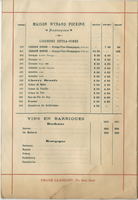Search the Special Collections and Archives Portal
Search Results
Artemus W. Ham Family Papers
Identifier
Abstract
The Artemus W. Ham Family Papers (1857-1970) contain postcards written by family members, newspaper clippings about the Ham family, and a Nevada Senate Concurrent Resolution memorializing Artemus W. Ham, Sr. Also included are genealogy notes, a commencement program from Michigan Law School, and membership cards of Artemus W. Ham, Sr.
Archival Collection
Ruthe Deskin Papers
Identifier
Abstract
The Ruthe Deskin Papers (1933-2004) document Deskin's career as a journalist and community activist in Nevada. The papers include Deskin's "Back and Forth" columns, newspaper articles about Deskin, awards and certificates, legal documents, correspondence, photographs, obituaries and memorials, convention programs from the Nevada Press Association, and biographical ephemera. The collection also contains certificates recognizing Deskin's work with Nevada youth from Greenspun Junior High School and Ruthe Deskin Elementary School, as well as the Boy Scouts of America and the Clark County Juvenile Court.
Archival Collection
Mildred Mann Papers
Identifier
Abstract
The Mildred Mann Papers (1915-1995) contain documents related to her involvement in teaching ceramics and her work with the Independent Order of Odd Fellows. Included are correspondence, newspaper clippings, magazines, certificates, childhood school materials, manuals, photographs, a scrapbook, and newsletters. There are also Clark County Community College (CCCC) class schedules, real estate papers, and membership lists.
Archival Collection
Cliff Segerblom Artwork
Identifier
Abstract
The Cliff Segerblom Artwork contains four pieces of Segerblom's artwork. One painting of a desert home in Nelson, Nevada titled "Afternoon in Nelson" from 1940, one drawing of the USS Hornet from 1969, and two watercolor paintings of Lake Mead and Sunrise Mountain. The First Annual Southern Nevada Art Exhibit originally displayed "Afternoon in Nelson" in Las Vegas, Nevada between January 27 and 28 in 1940. The USS Hornet drawing was created November 1969, depicting a fighter aircraft aboard the USS Hornet at Apollo 12's splashdown. The two watercolors were donated to the University in 1962 by the Clark County Panhellenic Association.
Archival Collection

Cindy Baca oral history interview: transcript
Date
Archival Collection
Description
Oral history interview with Cindy Baca conducted by Barbara Tabach on May 22, 2019 for the Remembering 1 October Oral History Project. Cindy Baca, born and raised in Las Vegas, talks about her family and occupation as a librarian at Escobedo Middle School. Cindy's twin daughters were present and injured during the Route 91 Festival and October 1 shooting. She describes their experiences and the Random Acts of Kindness project she piloted at her school after the incident.
Text
Stewart, Helen Jane Wiser, 1854-1926
Helen Jane Wiser Stewart was born in 1854 in Springfield, Illinois. When she was nine years old, the family moved to Nevada, and then to Sacramento, California in 1863. Helen was educated in Sacramento and in 1873 she married Archibald Stewart in Stockton, California.
Person
Jay Sarno Photograph Collection
Identifier
Abstract
The Jay Sarno Photograph Collection (1947-1983) contains photographs from hotel and casino developer Jay Sarno. The photographs primarily depict Sarno and his family. The photographs also depict some of Sarno's development projects, including Circus Circus, Caesars Palace, and the Grandissimo. The photographs depict construction of the hotels, events, and famous figures.
Archival Collection
Marjorie Barrick Museum of Natural History Records
Identifier
Abstract
The Marjorie Barrick Museum of Natural History Records (1939-2003) detail the creation of the Marjorie Barrick Museum of Natural History in Las Vegas, Nevada founded by Richard H. Brooks, a professor of anthropology at the University of Nevada, Las Vegas. The records are comprised primarily of correspondence between Brooks and members of the Southwestern Anthropological Association (SWAA), the Society for California Archaeology (SCA), and the meetings and exhibitions of the Nevada State Museum. The collection also contains financial statements that describe expenses for supplies, research, and excursions. Also included are anthropological, archaeological, and historical publications, as well as administrative files and Richard Brooks' correspondence with the Nevada Archaeological Survey (NAS). The collection also includes architectural floor plans for the Classroom and Physical Education, the original space that was converted into the museum in 1980, and plans for the redesign of the Barrick Museum and the Harry Reid Environmental Research Center addition.
Archival Collection
Lake-Eglington Family Photograph Collection
Identifier
Abstract
The Lake-Eglington Family Photograph Collection contains photographs of the Lake-Eglington Family in and around Las Vegas, Nevada from 1900 to 1976. The materials include photographs of early Las Vegas resident Olive Lake-Eglington and her family shortly after they moved to Las Vegas in 1904, as well as her eventual husband Earle Eglington after he moved to Las Vegas in 1911. The materials also include photographs of Native American artifacts, schools in Clark County, Nevada, artesian wells, the Hoover (Boulder) Dam, the Colorado River, Mt. Charleston, the Mormon Fort, the Stewart (Kiel) Ranch, the Las Vegas Ranch, and many early residents of Las Vegas.
Archival Collection

